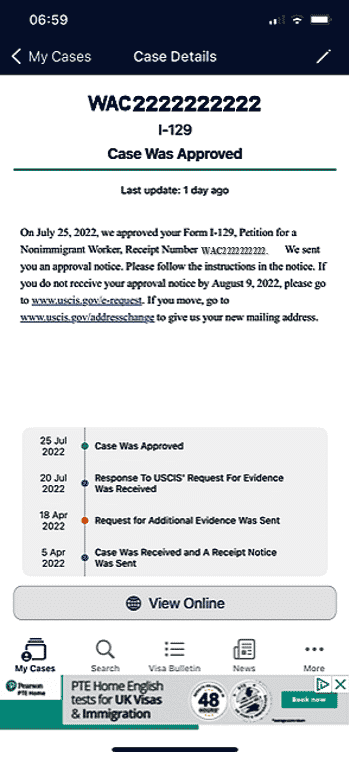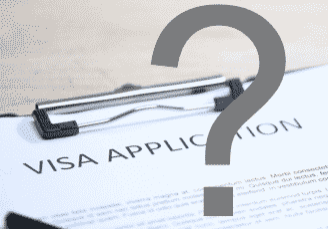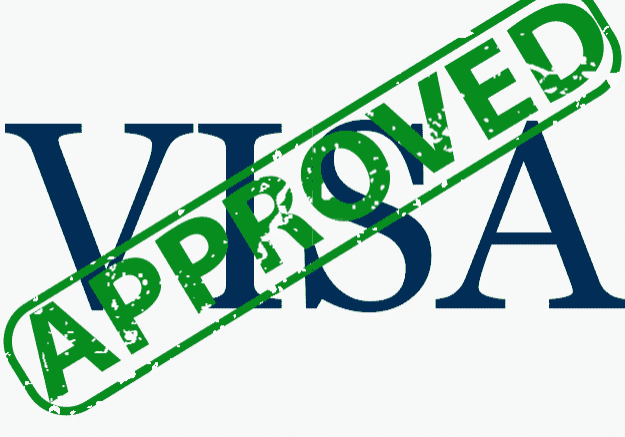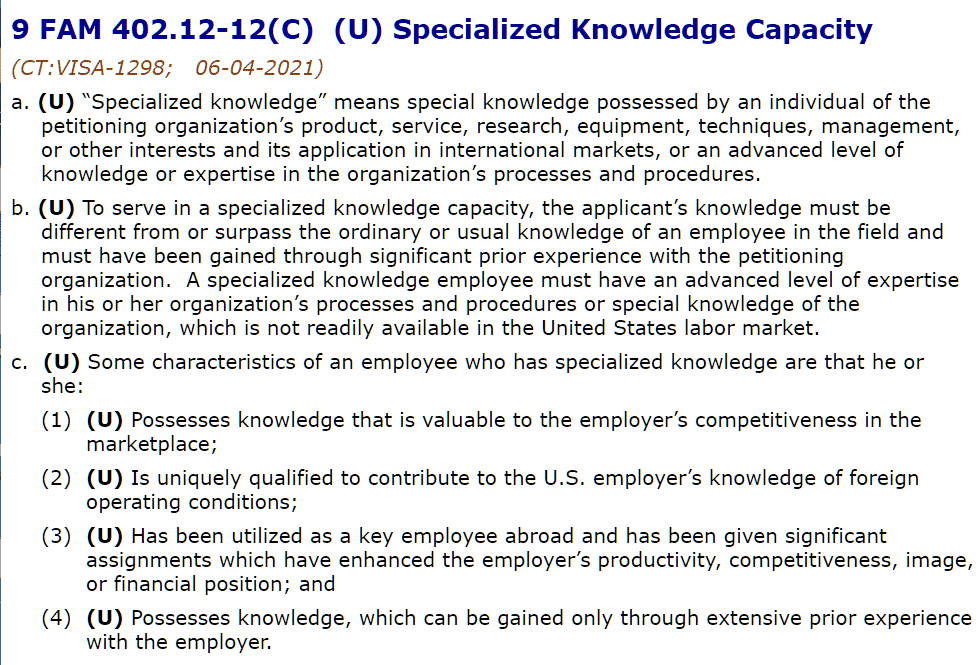
A Successful L1B RFE Response
We thought we would update this post to share one of our recent successes: An approval of our response to an L1B Specialized Knowledge RFE. The WAC number has been altered for privacy but the outcome has not--it was a good one. It was a very complex one so we share our client's relief that it was accepted. The client has made a consular appointment and will be in the United States shortly.
We believe that our successful RFE and NOID responses result from a due diligent approach that is focused on answering all USCIS issues and questions. Whether or not we agree with the points raised is irrelevant: answering them thoroughly is still the only sure way to approval. This is not always the easy way because it is sometimes frustrating to have to answer parts of the RFE or NOID--especially if you don't think you should have to answer them.
In the end, however, it doesn't matter whether you want to answer the inquiry point by point: If you don't, you may not get your response approved. With your visa in the balance, this is no time to do anything but provide the best response possible.
Have You Received a RFE or NOID?
Contact us and we will review the RFE or NOID at no charge; and then we will tell you how we can help you resolve it.
L1B RFE: Navigating the Specialized Knowledge Requirements

L1B RFE burden of proof. The L1B RFE will often cite the petitioner's failure to establish specialized knowledge on the part of the beneficiary. While guidelines exist for adjudicators to follow, this still can be a discretionary decision. The beneficiary's view of their specialized knowledge does not always coincide with that of the adjudicator. This Case Study illustrates a situation where we successfully responded to an L1B RFE.
L-1B Intracompany Transferee Specialized Knowledge
The 2021 USCIS definition of the L-1B nonimmigrant classification is that it enables a U.S. employer to transfer a professional employee with specialized knowledge relating to the organization’s interests from one of its affiliated foreign offices to one of its offices in the United States. This classification also enables a foreign company that does not yet have an affiliated U.S. office to send a specialized knowledge employee to the United States to help establish one.
The challenge
The Petitioner's Quandry
III. SPECIALIZED KNOWLEDGE
How the USCIS adjudicator viewed it:
The primary issue in this matter is whether the Petitioner established that the Beneficiary possesses specialized knowledge and whether the Beneficiary has been employed abroad and will be employed in the United States, in a specialized knowledge capacity.
The Petitioner
The Petitioner explained that the Beneficiary was an IT professional whose expertise was required to build security operations centers that use the Company's "cutting edge" cybersecurity software. The beneficiary was believed to be the only person in the Company with enough in-depth knowledge of the software to ensure aggressive expansion into the US market. Rapid deployment would reduce costs and maximize revenue. The software and the security operations centers built around it were both disruptive models that required specialized knowledge to implement them. Since the software and security operations centers were proprietary, an understanding of how to implement them could not be considered common industry knowledge.
Quick SitelLinks to More Information
The Request for Evidence
In the request for evidence (RFE), it was noted that the Petitioner did not provide sufficient evidence establishing that "special" or "advanced" knowledge was required to perform the Beneficiary's duties with the foreign entity and pointed out that the Petitioner did not specify the amount of time or the specific training that was required for the Beneficiary to attain the knowledge that is claimed to be specialized. It was stated that the Petitioner could address these areas of concern by: identifying the tools or techniques that require specialized knowledge, explaining how the Beneficiary's knowledge is either "special" or "advanced," providing evidence of prior training the Beneficiary had undergone, and specifying the minimum time required to gain the knowledge that is claimed to be specialized.
The solution
A Happy Adjudicator and a successful L1B RFE response
In this case, it was decided to provide as much information as possible rather than to provide only the bare minimum. One of the most significant omissions in the original presentation was the role of the Beneficiary in developing the software and the framework for the security operations centers. We built the RFE response around correcting that deficiency.
As part of the response, we provided more detail on how the Beneficiary could successfully set up and manage a SOC using the Company's proprietary cybersecurity software.
The Beneficiary's role in developing the patent-pending automated threat modeling software--including her name among others on the patient application--was explained with specific reference to the part of the software she developed independently.Below are highlights of the case we presented.
- Beneficiary received a degree in computer science from the University of Sao Paulo, one of the best South American institutions for that field of study.
- Beneficiary began to work for this Company after graduation as a risk management consultant, security software developer for specific companies and as a threat protection specialist.
- In the interim, she obtained essential cybersecurity certifications as a Certified Information System Security Professional (CISSP), Certified Information Security Manager (CISM), Certified Information Systems Auditor (CISA), NIST Cybersecurity Framework (NCSF), and GIAC Information Security Professional (GISP).

- In 2018, she became the lead developer on a project to develop a state-of-the-art threat modeling system that could be run by employees without computer science degrees.
- The Beneficiary developed the concept and the architecture. Once it got to the testing phase, she created the means for testing and evaluating it on customers who were willing to beta test it.
- Once testing was complete, the Company applied for a patent--a copy of the patent application was included with the response.
- The Company decided that a virtual security operations center could be built around the software and the Beneficiary was the point person on that project. She set up and managed several such SOC operations for Company clients.
- Her name appears on the patent application (which she wrote) along with other developers and Company officials.
A detailed statement of her job functions while developing this software, testing it, developing the SOC concept, and working with clients was presented.
Once the Beneficiary’s background, education, experience—and specialized knowledge—had been documented, her RFE response was accepted.

The results
Our Response Enabled the Petitioner to Meet the Burden of Proof
Not all RFE responses are successful. This one, however, was well-founded and addressed specifically USCIS concerns about the Petitioner's contention. By answering the questions raised point by point with thorough, relevant documentation, the Petitioner's case was ultimately validated and the L1B visa issued.
L1B RFE Burden of Proof
The adjudicator may use a number of questions to determine if the petitioner has met the burden of proof.
- Does the employee possess knowledge of foreign operating conditions that is of significant value to the petitioning organization’s U.S. operations?
- Has the employee been working abroad in a capacity involving assignments that have significantly enhanced the employer’s productivity, competitiveness, image, or financial position?
- Can the employee’s claimed specialized knowledge normally be gained only through prior experience with the petitioning organization?
- Does the employee possess knowledge of a product or process that cannot easily be transferred or taught to another individual without significant economic cost or inconvenience?
- Does the employee have knowledge of a process or a product that is either sophisticated or complex, or of a highly technical nature, although not necessarily unique to the petitioning organization?
- Does the employee possess knowledge that is particularly beneficial to the petitioning organization’s competitiveness in the marketplace?
What Guidance IS Adjudicators Given About L-1b Specialized Knowledge Petitions?
9 FAM 402.12-12(C) (U) Specialized Knowledge Capacity
This section of the
9 FAM 402.12
(U) INTRACOMPANY TRANSFEREES - L VISAS
(CT:VISA-1311; 06-30-2021)
(Office of Origin: CA/VO)
provides advisory definitions and information for adjudicators. Reviewing these guidelines gives some insight into what adjudicators are looking for when they review specialized knowledge petitions
L1B AAO Nonprecedent Decisions
Reviewing appeals--especially those that were dismissed--can provide valuable information about what the adjudicators are looking for in a successful petition. Below are downloads links to a few such decisions.
January 16, 2020
January 31, 2020
May 21, 2020
May 22, 2020
October 23, 2020
December 16, 2020
December 17, 2020
March 29, 2021

Quick SitelLinks to More Information
USCIS Case Status Online
Check the status of your case online with receipt number. The receipt number consists of three letters followed by 10 numbers. For example, the letters can be EAC, WAC, LIN, SRC, NBC, MSC or IOE. It is a very simple process. You can verify your case status online from your home or office, even from your cell phone!
